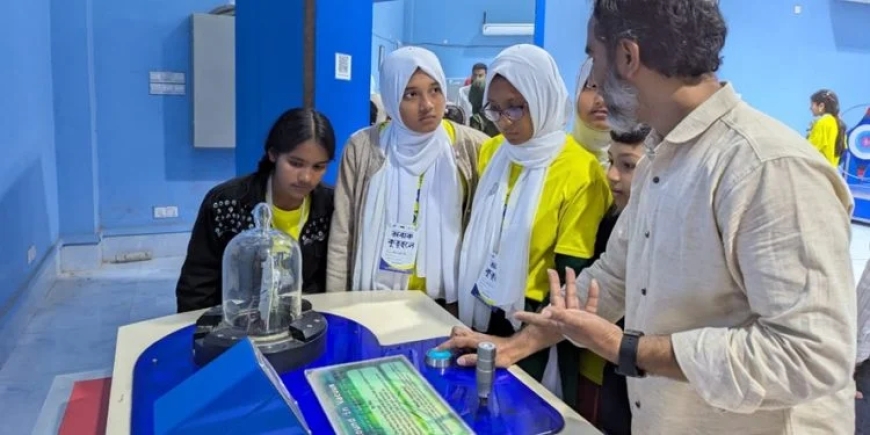Coastal Girls Explore Science and Technology in Dhaka

A group of underprivileged female students from Bangladesh’s coastal regions recently participated in “Obak Kutuhole,” a science and technology-focused educational tour in Dhaka. Under the STEM and ICT Skills for the Girls of Coastal Areas project, the students visited various scientific and technological institutions on February 7 and 8. After completing their tour, they returned home on February 9 with a renewed commitment to acquiring essential skills for their future careers.

Saima Sadia Jhilick, a ninth-grade student from Comrade Ratan Sen Collegiate Girls’ High School in Rupsha, Khulna, was thrilled to visit Brain Station 23, a software company. She expressed her aspirations, saying, “Today, I came here as a visitor, but one day, I will return as an employee of such an organization.” Similarly, Shaharia Sultana Shakila, an eighth-grade student from Shahid Ali Ahmed Government Girls’ High School in Tala, Satkhira, was inspired by the stories of female employees at the company. She remarked, “I used to think that my education in the village was sufficient. But hearing their stories, I realized that a vast world exists beyond my locality, and I must work much harder to reach it.”
Like Jhilick and Shakila, 36 students embarked on their journey to Dhaka by bus on February 6. Despite coming from six different schools across three districts, the trip fostered a strong bond among them. Their exploration of the capital began on February 7 with a visit to the historic sites of Dhaka University, including Aparajeyo Bangla, the Arts Building, the Central Shaheed Minar, TSC, and Curzon Hall. They then visited the Institute of Information Technology before heading to Brain Station 23, where female employees shared their career journeys, inspiring the students with their dedication and perseverance.

In the evening, the students engaged in an interactive discussion with Dr. Lafifa Jamal, Professor of Robotics and Mechatronics Engineering at Dhaka University, IT entrepreneur Syeda Kamrun Ahmed, and Bangladesh Open Source Network (BdOSN) President Munir Hasan. The conversation covered various topics, including career aspirations and the challenges of early marriage. One student, Nawrin from Rupsha, shared how she and her peers successfully prevented a friend’s child marriage with the help of their teachers and local authorities. However, she noted, “Convincing her parents to allow her to continue her education remains a challenge. We believe that awareness programs should also target parents alongside students.”
On February 8, the students visited the National Parliament Building to learn about its history and architectural significance. They then toured the Bangabandhu Military Museum, where officials guided them through various exhibits. In the afternoon, they explored the National Museum of Science and Technology, where interactive displays on space science, physics, and innovation fascinated them. Fatema Akter Shahnaz, a tenth-grade student from Naihat High School in Rupsha, was particularly captivated by the physics exhibition. She said, “The concepts I studied in textbooks—Newton’s Third Law, gravitational force, barometers, and centrifugal force—became much clearer after seeing their real-life applications.”
Sapna Rani Biswas, an assistant teacher from Comrade Ratan Sen Girls’ High School, emphasized the significance of such initiatives. “In areas where child marriage is a severe issue, more programs like ‘Obak Kutuhole’ are needed. These experiences broaden the students’ perspectives and encourage them to pursue careers. I believe such initiatives can play a crucial role in preventing child marriage and empowering girls in the workforce.”
The Obak Kutuhole 2025 event was organized under BdOSN’s Missing Daughter initiative as part of the STEM and ICT Skills for the Girls of Coastal Areas (SISGCA) project, supported by the Malala Fund.








































































































































































































